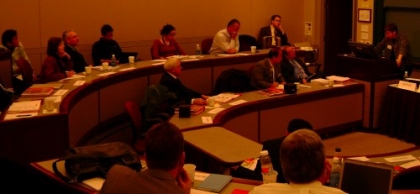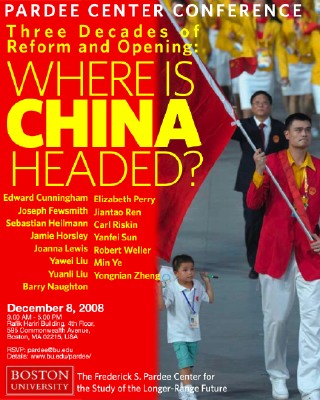Pardee Center Holds Conference on “Where is China Headed?”

An international group of distinguished scholars came together to discuss the future China in terms of politics, religion, law, economics, energy, the environment and health care during an all-day conference on December 8 titled “Three Decades of Reform and Opening: Where is China Headed?”
Sponsored by the Frederick S. Pardee Center for the Study of the Longer-Range Future, the conference took place at the Rafik Hariri Building at Boston University’s School of Management. More than a hundred people attended the four sessions and the luncheon plenary of the all-day conference.
 The conference was organized by well-known China expert Joseph Fewsmith, a Pardee Center Faculty Fellow and a Professor in BU’s departments of International Relations and Political Science. Papers were presented by 14 leadings China scholars, including by Professor Fewsmith and other China experts from around the U.S. as well as from China and Germany. These papers will be collected in an edited book expected to be published in 2009.
The conference was organized by well-known China expert Joseph Fewsmith, a Pardee Center Faculty Fellow and a Professor in BU’s departments of International Relations and Political Science. Papers were presented by 14 leadings China scholars, including by Professor Fewsmith and other China experts from around the U.S. as well as from China and Germany. These papers will be collected in an edited book expected to be published in 2009.
Several Boston University faculty members served as session moderators, including Professor John Gerring (Political Science), Professor Richard Norton (International Relations, Anthropology), Assistant Professor Kevin Gallagher (International Relations), and Profesor Robert Kaufmann (Geography and Environment). Pardee Center Director and Professor Adil Najam (International Relations, Geography and Environment) delivered opening and closing remarks.
In most of the areas discussed – such as religion, the development of administrative laws, and more capitalistic economic policies – panelists said changes are continuing to evolve and it is difficult to make predictions about the future. For example, despite the fact that top level government officials are appointed by the Communist party, citizens increasingly are given the opportunity to provide comments on proposed policies and regulations in some areas and can pursue legal recourse when stated government policies are not followed. But whether such measures will lead to greater movement toward a more democratic government is uncertain at this point.
Panelists discussing China’s economy noted that the country’s recent rapid rise as a global economic player was the result of focused and specific government policies. But how China will weather the current economic crisis remains to be seen.
The lunch session of the conference featured a keynote address by Stapleton Roy, the former U.S. Ambassador to China (see related posting) and remarks by BU Provost David Campbell.
 The conference program was as follows:
The conference program was as follows:
Three Decades of Reform and Opening:
Where Is China Headed?
Coffee, Continental Breakfast – 8:00-8:30
CONFERENCE WELCOME – 8.30-8.45
Adil Najam, Director, Pardee Center
Joseph Fewsmith, Conference Chair
POLITICS: 8:45-10:15 (View Video Here)
Chair and Discussant: John Gerring
Min Ye – How China Joined the Capitalist World through Foreign Direct Investment? Social Network Approach to China’s Economic Reform
Joseph Fewsmith – The Challenge of Maintaining a One-Party State
Yawei Liu – China’s Elusive Quest for Choice: From the Qingxian Model to the Guiyang Experiment
Jiantao Ren – Ideology in Contemporary China
Break: 10:15-10:30
SOCIAL ORDER: 10:30-11:45 (View Video Here)
Chair and Discussant: Richard Norton
Elizabeth Perry – Popular Protest in Contemporary China: Playing by the Rules
Robert Weller and Sun Yanfei – Power of the Periphery: The Dynamics of Religious Growth and Change in Contemporary China
Jamie Horsley – Progress and Paradox: The Limits of Legal Reform in China
LUNCH KEYNOTE PLENARY: 12:00-1:30 (View video here)
Remarks by David K. Campbell, Provost, Boston University
Keynote Address by Amb. Stapleton Roy,
Former U.S. Ambassador to Singapore (1984-86), China (1991-95) and Indonesia (1996-99).
ECONOMICS AND ECONOMIC DECISION-MAKING: 1:45-3:15 (View Video Here)
Chair and Discussant: Kevin Gallagher
Barry Naughton – Growth in China: From High-Speed to High-Quality
Sebastian Heilmann – Authoritarian Upgrading? The Innovative Potential of China’s Economic Governance
Carl Riskin – Income inequality
Break: 3:15-3:30
SYSTEMIC CONSTRAINTSs: 3:30-5:00 (View Video Here)
Chair and Discussant: Robert Kaufmann
Yongnian Zheng – China’s central-local relations: How they constrain political changes
Yuanli Liu – Reforming Chinas Health Care System: The Balancing Act
Edward Cunningham – The Energy Sector
Joanna Lewis – China’s Environment
CLOSING COMMENTS – 5.00-5.15
Joseph Fewsmith, Conference Chair
Adil Najam, Director, Pardee Center